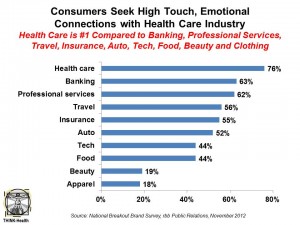 83% of consumers would pay more for a product or service from a company they feel puts them first, finds rbb Public Relations in their 2012 Nationwide Breakout Brand Survey. Emotional connections matter most in health care, say 76% of U.S. consumers, followed by banks (63%), professional services (62% – think: accountant, financial planner, estate lawyer), travel (56%), insurance (55%) and autos (52%). Interestingly, apparel and beauty rank the lowest in the poll – with only 18% and 19% of consumers looking for emotional connections from those industries. The top 10 breakout brands on the emotional front are
83% of consumers would pay more for a product or service from a company they feel puts them first, finds rbb Public Relations in their 2012 Nationwide Breakout Brand Survey. Emotional connections matter most in health care, say 76% of U.S. consumers, followed by banks (63%), professional services (62% – think: accountant, financial planner, estate lawyer), travel (56%), insurance (55%) and autos (52%). Interestingly, apparel and beauty rank the lowest in the poll – with only 18% and 19% of consumers looking for emotional connections from those industries. The top 10 breakout brands on the emotional front are
- Apple
- Amazon
- Chick-fil-A
- Walmart
- Costco
- Starbucks
- Zappos
- Toyota, and
- Ford.
According to rbb, to become a Breakout Brand, a company needs to deliver better services/products with a laser-sharp focus on customers. Here, the customer is #1 and companies respect feedback loops, listening and responding to customers.
Health Populi’s Hot Points: It is no surprise to me that a huge majority, 3 in 4 consumers, are looking for emotional connection from the health care industry. What is more personal than health and health care for ourselves and for the people we care for? Yet not one organization involved in health or health care emerges as one of the top 10 Breakout Brands in the rbb analysis. Yet, as they point out, there are health care companies in Fortune Magazine’s list of “most admired,” including Johnson & Johnson and St. Jude Medical, the device company.
The emotion gap between consumers and the health care industry is crucial to bridge for a number of strategic reasons: first, trust between people and health care organizations breeds patient engagement, which yields better health literacy and outcomes. Second, consumer love nurtures brand commitment from a purchaser year-on-year: in the case of a health plan, for example, retaining that enrollee and her family for a second, third, and fourth year represents an annuity of a premium payment, or for a pharmaceutical company, sustained use of a prescribed drug therapy. Third, the emotional connection in health care brings positive word-of-mouth to friends and family — which notwithstanding the growing availability of online resources for health care report cards grading doctors, plans and hospitals, along with prices — continues to be a highly trust channel for health information.
Ironically, we see emotional appeals to consumers for apparel and beauty products — the two most low-rated categories for consumer seeking emotional connections with industry.
Health care: where’s your emotional IQ? Health consumers want you to grow it.




 I'm in amazing company here with other #digitalhealth innovators, thinkers and doers. Thank you to Cristian Cortez Fernandez and Zallud for this recognition; I'm grateful.
I'm in amazing company here with other #digitalhealth innovators, thinkers and doers. Thank you to Cristian Cortez Fernandez and Zallud for this recognition; I'm grateful. Jane was named as a member of the AHIP 2024 Advisory Board, joining some valued colleagues to prepare for the challenges and opportunities facing health plans, systems, and other industry stakeholders.
Jane was named as a member of the AHIP 2024 Advisory Board, joining some valued colleagues to prepare for the challenges and opportunities facing health plans, systems, and other industry stakeholders.  Join Jane at AHIP's annual meeting in Las Vegas: I'll be speaking, moderating a panel, and providing thought leadership on health consumers and bolstering equity, empowerment, and self-care.
Join Jane at AHIP's annual meeting in Las Vegas: I'll be speaking, moderating a panel, and providing thought leadership on health consumers and bolstering equity, empowerment, and self-care.